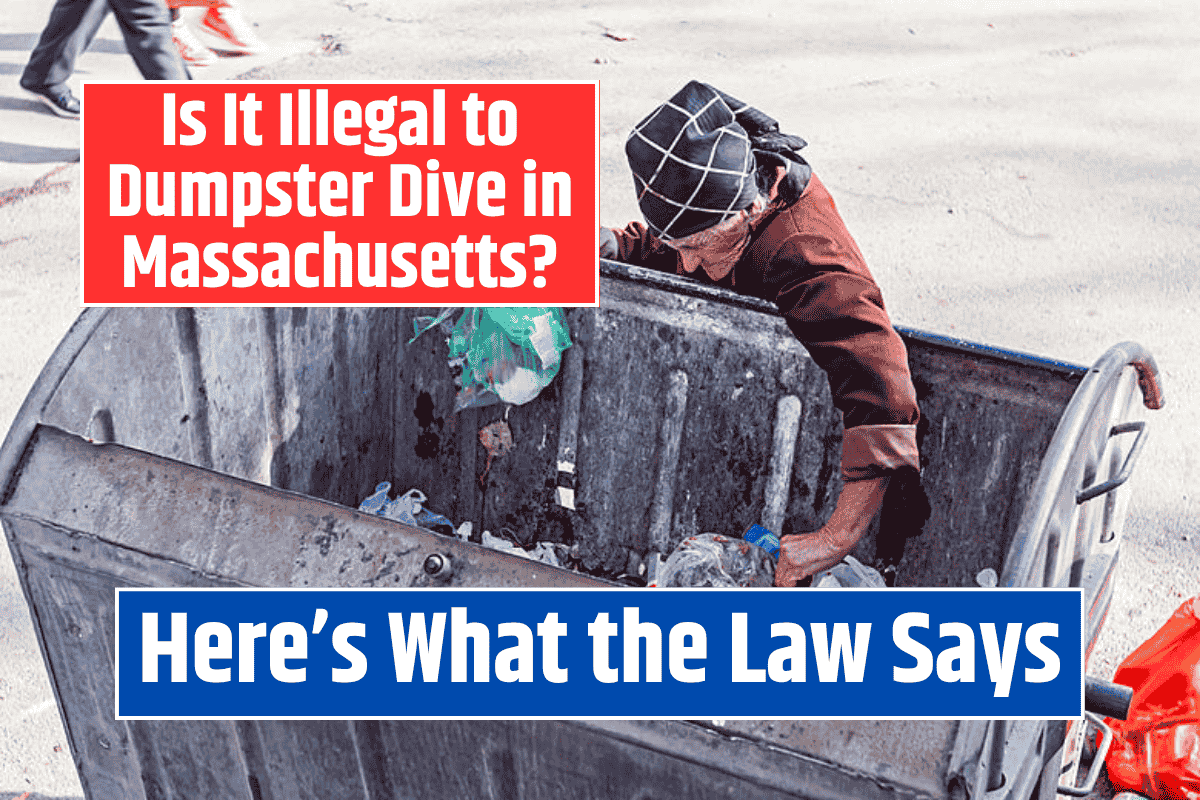Dumpster diving is when people search through trash bins to find items that can still be used. This can include food, clothes, electronics, and more. Many people do this to save money, reduce waste, or even help others. But the big question is: Is dumpster diving legal in Massachusetts?
This guide explains what the law says, what to watch out for, and how to dive safely and legally in Massachusetts.
What the Law Says About Dumpster Diving in Massachusetts
Dumpster diving is not directly banned under Massachusetts state law. That means there’s no specific law that says you cannot take items from trash bins. But that doesn’t mean you can dive anywhere without any problems. The rules change based on where the dumpster is located.
Public Property
If trash is placed out on the curb for collection, it is usually considered abandoned. A U.S. Supreme Court case (California v. Greenwood, 1988) confirmed that police can legally go through trash without a warrant once it’s on public property. This indirectly makes dumpster diving legal on public land in many cases.
Private Property
Things are different when it comes to private property. If a dumpster is:
Behind a store
Inside a fenced area
In a gated apartment complex
…and you enter the space without permission, it can be considered trespassing. Even if the dumpster is visible, if it’s on private land, diving can result in legal trouble, including trespassing or even theft if you take something of value.
City Laws
Some Massachusetts cities have their own rules. For example:
Boston has strict sanitation and waste control laws that may not allow dumpster diving in certain areas.
Suburban towns may be more flexible, especially if no signs are posted.
Always check local city or town rules before diving to stay safe.
Why Do People Dumpster Dive?
People dumpster dive for many reasons:
To save money on food, clothes, or household goods.
To reduce waste and protect the environment.
To donate items to shelters or reuse old electronics.
To find hidden treasures—many stores throw away usable items like fresh bread, returnable goods, or tech items with small defects.
The U.S. Environmental Protection Agency (EPA) says over 140 million tons of trash go into landfills every year. Many of these items could be reused. Dumpster diving helps reduce this waste.
Risks and Safety Tips
Dumpster diving can be risky if you’re not careful. Here’s what to watch out for:
Injuries from sharp objects like broken glass or metal
Rotten or spoiled food that can cause illness
Legal issues like trespassing or disorderly conduct
Privacy problems if you take documents with personal details
How to Stay Safe
Wear gloves and strong shoes
Use tools like grabbers to avoid injury
Don’t take documents with private information
Always leave the area clean
Avoid locked dumpsters or areas with warning signs
How to Dive Legally in Massachusetts
To stay legal while dumpster diving in Massachusetts:
Stick to public bins or trash left at the curb.
Avoid private areas unless you have permission.
Do not enter fenced areas or climb over gates.
Dive during daylight to avoid looking suspicious.
Be polite if questioned, and leave if asked.
In most cases, police focus on trespassing, not on dumpster diving itself.
Is Dumpster Diving Right or Wrong?
This depends on how people see it. Some say it’s a smart and eco-friendly choice. Others think it’s disrespectful or unsafe, especially on private land.
Many stores don’t mind if you dive quietly and respectfully. Some even leave items outside on purpose for people to take. Just make sure to take only what you need and don’t leave a mess.
Dumpster Diving Culture and Communities
Dumpster diving has grown into a big community activity:
Reddit’s r/DumpsterDiving has over 200,000 members sharing photos, safety tips, and legal updates.
Many cities have local groups who collect good items and donate them to food banks or shelters.
Freeganism is a movement where people live by reusing what others throw away.
People like Reddit user @GroceryGuerilla say they save over $400/month by diving behind bakeries and stores.
Real-Life Example
In Minneapolis, the group “Zero Waste Divers” meets every week to exchange found items and help the environment. They even teach others how to dive safely.
Tips for Beginners
If you’re new to dumpster diving, here are a few tips:
Visit grocery stores and bakeries—they throw away fresh items every day.
Go after closing time, but before trash collection.
Bring a friend for safety.
Use a strong bag to carry your finds.
Clean everything properly before using.
Check your city website for local rules.
Avoid sharing exact locations online to avoid crowding.
Ask local shops politely—they may be willing to help.
Dumpster Diving and the Environment
Dumpster diving helps the planet. According to the EPA, about 30% of waste in landfills can be reused. By rescuing food, electronics, and clothes, divers:
Reduce greenhouse gases
Save resources
Support sustainability
Help businesses reduce waste costs
Some even turn old finds into art projects or resell them online.
Handling Problems
If a store worker or local person confronts you:
Stay calm and be respectful
Leave quietly if asked
Keep a copy of local laws if needed, but don’t argue
Avoid legal trouble by diving in safe and legal spots
Police usually respond if there’s a complaint, especially for trespassing. If questioned, say you’re taking discarded items, not stealing.
The Future of Dumpster Diving
Dumpster diving is growing as more people face high costs and want to reduce waste. Some cities may support it with new policies, while others might set stricter rules.
New apps help divers track pickup times, and social media spreads helpful tips. But with more attention, there’s also more risk of bans.
That’s why it’s important to be careful, respectful, and informed—so dumpster diving remains safe and legal for everyone.












